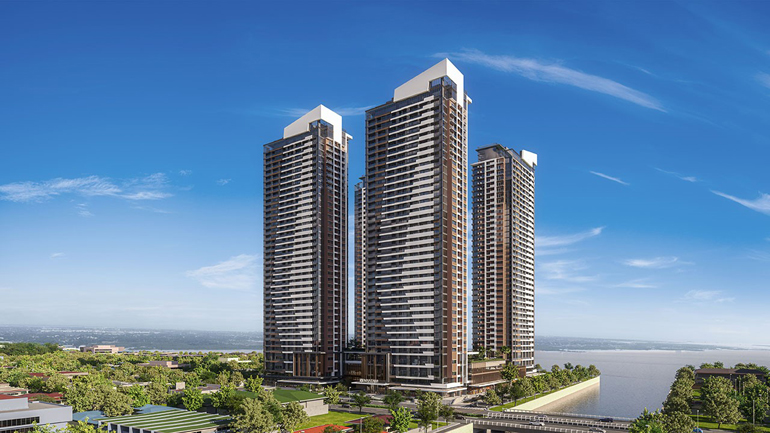
Sustainability and resilience beyond infrastructure
By Mhicole A. Moral
A significant portion of the population in the Philippines currently resides in cities. Projection from the United Nations Human Settlements Programme, also known as UN-Habitat, indicate that approximately 84% of the population will live in urban areas by 2050. The country is also frequently devastated by natural disasters, resulting in billions of dollars in damages and the displacement of millions of people, particularly in urban areas.
As climate change and rapid urbanization increasingly concern the Philippines, addressing these challenges requires comprehensive and sustainable strategies to ensure that rapid urban growth benefits the population as a whole. Robinsons Land Corp. (RLC), which was highly commended as Best Sustainable Developer recently at the 12th PropertyGuru Philippines Property Awards, is among those companies taking the lead in crafting and implementing such strategies through developments that pave the way for sustainable communities.
In his presentation during the latest edition of BusinessWorld Insights forum, held last July 31, RLC’s Chief Strategist Ramon Rivero emphasized that real estate developments should not only focus on constructing buildings but also on creating sustainable and resilient environments that can thrive in the face of environmental and societal challenges.
“As we stand at the crossroads of rapid urbanization and environmental stewardship, the real estate in the Philippines holds a unique position of influence and responsibility. The choices we make today will shape the landscapes, economies, and quality of life for generations to come,” Mr. Rivero said.
He further noted that the fast-growing cities in the Philippines demand housing, commercial spaces, and infrastructure. However, these developments must integrate sustainability, ensuring that environmental integrity is preserved.

For Robinsons Land, sustainability is integrated into every facet of its operations. From commercial properties and hotels to residential condominiums, logistics centers, and warehouses, the company remains committed to using eco-friendly materials, installing energy-efficient systems, and developing properties with minimal environmental impact.
Among the most notable examples is the installation of solar panels in 24 RLC malls, which generate a total of 31 megawatts of clean energy. In turn, this results in 182 million kilowatt-hours of clean energy and avoided 129,000 metric tons of carbon dioxide.
Meanwhile, sustainability also encompasses the need for resilient infrastructure, especially in a country as vulnerable to natural disasters as the Philippines. Typhoons have wreaked havoc on Filipino communities, destroying homes, crippling infrastructure, and upending lives. The cost is staggering, both in human and economic terms.
Robinsons Land’s approach to sustainability is its focus on building resilient infrastructure. Mr. Rivero noted that buildings and communities must be designed to withstand the increasing intensity of natural disasters. This method requires adhering to rigorous construction standards, integrating flood defenses, and incorporating adaptive features that ensure long-term durability. To date, 16 properties of RLC have earned Leadership in Energy and Environmental Design (LEED) or Excellence in Design for Greater Efficiencies (EDGE) certifications.
Holistic urban planning

Sustainability is not just limited to individual buildings but extends to the overall layout of cities. RLC focuses on creating communities that promote sustainable living through integrated public transportation, green spaces, and walkable neighborhoods.
One notable example is RLC’s mixed-use development, Bridgetowne in Pasig City. This flagship project integrates residential, commercial, and recreational spaces while prioritizing environmental responsibility by encouraging walking, cycling, and public transportation.
Beyond brick and mortar, sustainability in real estate is about people. The chief strategist of RLC emphasized the importance of involving local communities in the planning and development process. By ensuring that the needs and voices of the people are heard, RLC aims to create spaces that not only promote environmental sustainability but also foster inclusivity.
Sustainability as a business imperative

Robinsons Land also prioritizes social sustainability through its corporate social responsibility (CSR) initiatives. Projects under the RLove program address key areas such as education, health, and environmental stewardship. Furthermore, the chief strategist said that the effects of climate change and rapid urbanization are too significant to ignore, but environmental stewardship and economic prosperity can go hand in hand. With this in mind, the real estate industry has the opportunity to drive positive environmental change while achieving long-term economic prosperity for all stakeholders.
RLC, like many other forward-thinking companies, recognizes that the journey toward sustainability will not be without challenges. Nonetheless, as it believes that sustainability is about enhancing the lives of Filipinos, Robinsons Land and its parent company, the Gokongwei Group, remain committed to integrating sustainable practices across operations.
“We believe that our core purpose is to enhance the lives of Filipinos by providing high quality products and services that all stakeholders can be proud of. And by doing so, we believe that we do not only drive the company’s long-term success, but we also contribute to the broader socioeconomic development of the Philippines,” Mr. Rivero concluded.
Spotlight is BusinessWorld’s sponsored section that allows advertisers to amplify their brand and connect with BusinessWorld’s audience by publishing their stories on the BusinessWorld Web site. For more information, send an email to online@bworldonline.com.
Join us on Viber at https://bit.ly/3hv6bLA to get more updates and subscribe to BusinessWorld’s titles and get exclusive content through www.bworld-x.com.



